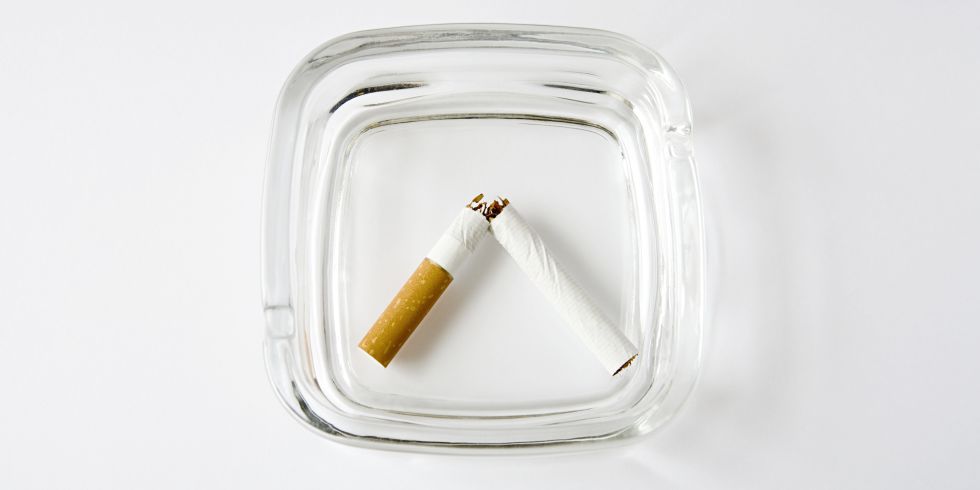
As anyone who’s tried to quit smoking will tell you, kicking the habit isn’t as easy as some people think it is. Undoing years – or even decades – of a habit takes effort, willpower and often some external guidance.
Knowing why you want to quit and having a goal in mind can be a huge motivation for staying on the right track, from putting your health first to needing to save some money. To find out the real-life triggers that cause people to quit, we spoke to seven ex-smokers about why they packed up the cigarettes and how their lives have changed since giving up the habit.
1. ‘I was prematurely ageing myself’ – Emma, London
“I always said that I’d stop smoking at 25 but I didn’t. At 27 I realised that I had been smoking for around 10 years and the thought of the damage it had done to my body in that time was the wake up call I needed. I started noticing the state of my hair, skin and nails and knew they’d look better if I quit.
“To help me quit, I followed a quit plan and haven’t looked back since. I feel much healthier and have noticed a marked improvement in my skin.”
Smoking has negative impacts on your hair, skin and nails, all of which can be halted by giving up cigarettes for good. To help you kick the habit, try My Quit Plan by Nicorette and work out the best way for you to go smoke-free. The plan will help you to assess your current habit and any quitting methods you’ve tried before to help you come up with a plan that works for you.
2. ‘My social life was suffering’ – Kelly, Edinburgh
“People often say that smoking is social, but for me it was almost the opposite. I stopped smoking because I was always going outside by myself to have a fag in the freezing cold. I went cold turkey and decided that I didn’t want to be the girl that is always missing out on nights out because I’m by myself, reeking of smoke.
“Nowadays, I don’t miss out on anything that happens on a night out. I get to be part of the group and I feel so much better the next morning than I used to when I was drinking and smoking at the same time.”
Ever since the smoking ban came into effect in 2007, the prevalence of smoking fell in subsequent years, particularly in younger age groups. Brown Universityalso discovered that people who smoked on a night out where heavy drinking was involved were also more likely to experience a hangover and more intense hangover symptoms too.
3. ‘The savings paid for a car’ – Rebecca, London
“When I was 21 I worked out that the amount I spent on smoking every week could fund running a car. I stopped immediately and a month or so later I bought a car. I loved that little motor.
“I never started smoking again, it gave me a huge amount of confidence knowing that I’d had the willpower to stop. I thought if I can do that, I can do anything.”
The cost of cigarettes has risen dramatically over the last few years, alongside a hike in taxes and smaller packets being taken off the shelves. On average, most people who quit save around £156 each month (based on an 11-a-day habit and a pack of 20 cigarettes costing £9.40), which adds up to nearly £1,872 a year according to the Nicorette Stop Smoking Calculator. That’s a big chunk of money to add to your annual savings.
4. ‘My confidence needed a boost’ – Arusha, Newcastle
“I originally stopped because I had bronchitis. I had to stop so I could breathe properly and it made me realise it’s pretty gross to have a mouth that smells like an ashtray.
“Now, knowing that my breath doesn’t stink, I’m so much more confident when meeting new people. This is especially true when it comes to meeting people in a professional capacity.”
Smoking is the main cause of chronic bronchitis, affecting both smokers and anyone inhaling secondhand smoke. Cigarettes also increase your risk of developing emphysema, where the air sacs inside your lungs become damaged, causing shortness of breath. As for halitosis, smoking causes your mouth to dry out, leading to bad breath. Cigarettes can also significantly affect the development of gum disease, another major cause of bad breath.
5. ‘Trying for a baby forced me to quit’ – Alexa, London
“I knew smoking wasn’t a great thing to do anyway, but it was trying for a baby that was the impetus in the end. I’d been smoking pretty heavily since I was 16 so it wasn’t a walk in the park, but I used inhalators to help.
“I wouldn’t start again – I’m now so aware of the impact of passive smoking on my children and the effect of secondary smoke clinging to my clothes and hair. One of my children has a viral wheeze so it’s a massive no-no.”
Smoking may reduce fertility in women and it’s thought to take around three months for an improvement in fertility levels after quitting. Smoking can be hugely damaging to young children after you’ve given birth, too – the NHS state that secondhand smoke contains more than 4,000 chemicals and can increase the risk of cot death, asthma, meningitis and serious respiratory conditions.
6. ‘I started to focus on my mental health’ – Jenni, Colchester
“The trigger to me stopping smoking was a general shift in my attitude. I get health anxiety quite badly so it seemed stupid to be doing something I knew was bad for me.
“I recognised that I smoked the most when I was miserable, anxious or stressed, so I made a conscious effort to take better care of my mental health. I spent time dealing with my issues, particularly after a break-up, and as soon as I’d handled that internally I didn’t feel like I needed to smoke as much.”
People with mental health problems are more likely to smoke than the general population (and smoke more heavily) but those who quit report a calmer and more positive mindset, according to the NHS. Their evidence suggests that the beneficial effect of stopping smoking on symptoms of anxiety and depression can equal that of taking antidepressants, while it has been shown that cigarettes can interfere with the efficacy of certain medicines. Smoking can also increase feelings of anxiety and irritability in people who don’t suffer from mental health issues.
7. ‘I couldn’t mix smoking with my medication’ – Rosie, London
“My GP told me that I wouldn’t be allowed to get my contraceptive pill anymore if I still smoked and hit 35, due to the additional health risks I’d be putting on myself. I think this is related to deep vein thrombosis.
“I wasn’t prepared to switch to another contraceptive so gave up smoking instead and I got to keep my pill – kind of the opposite of giving up because you’re pregnant…”
The majority of birth control pills contain synthetic versions of oestrogen, the female hormone. This hormone can increase the risk of developing blood clots and deep vein thrombosis (the risk of which increases with age), which can lead to strokes, heart attacks or pulmonary embolisms, meaning this particular type of contraception isn’t prescribed for women who have two or more risk factors, such as being in your mid-thirties and smoking.
[“source=netdoctor”]











